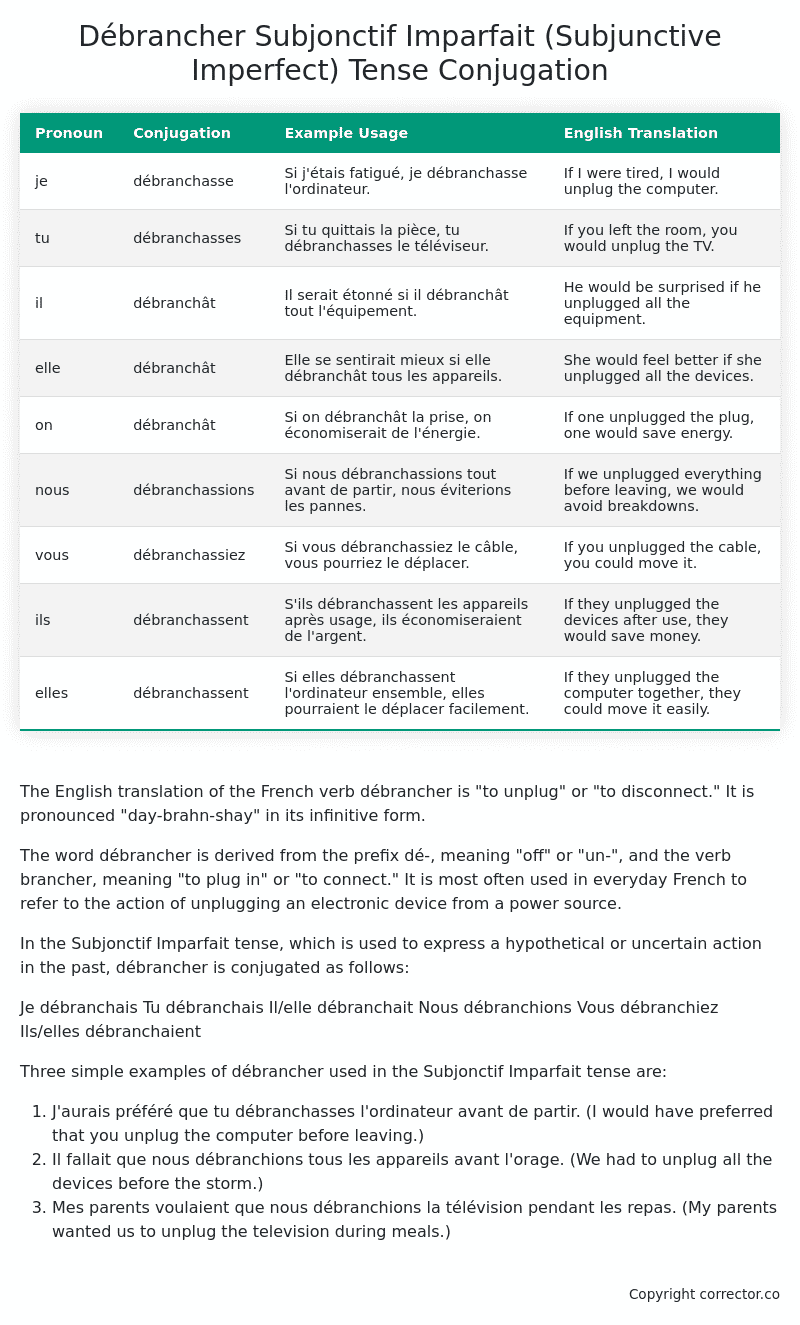Subjonctif Imparfait (Subjunctive Imperfect) Tense Conjugation of the French Verb débrancher
Introduction to the verb débrancher
The English translation of the French verb débrancher is “to unplug” or “to disconnect.” It is pronounced “day-brahn-shay” in its infinitive form.
The word débrancher is derived from the prefix dé-, meaning “off” or “un-“, and the verb brancher, meaning “to plug in” or “to connect.” It is most often used in everyday French to refer to the action of unplugging an electronic device from a power source.
In the Subjonctif Imparfait tense, which is used to express a hypothetical or uncertain action in the past, débrancher is conjugated as follows:
Je débranchais
Tu débranchais
Il/elle débranchait
Nous débranchions
Vous débranchiez
Ils/elles débranchaient
Three simple examples of débrancher used in the Subjonctif Imparfait tense are:
- J’aurais préféré que tu débranchasses l’ordinateur avant de partir. (I would have preferred that you unplug the computer before leaving.)
- Il fallait que nous débranchions tous les appareils avant l’orage. (We had to unplug all the devices before the storm.)
- Mes parents voulaient que nous débranchions la télévision pendant les repas. (My parents wanted us to unplug the television during meals.)
Table of the Subjonctif Imparfait (Subjunctive Imperfect) Tense Conjugation of débrancher
| Pronoun | Conjugation | Example Usage | English Translation |
|---|---|---|---|
| je | débranchasse | Si j’étais fatigué, je débranchasse l’ordinateur. | If I were tired, I would unplug the computer. |
| tu | débranchasses | Si tu quittais la pièce, tu débranchasses le téléviseur. | If you left the room, you would unplug the TV. |
| il | débranchât | Il serait étonné si il débranchât tout l’équipement. | He would be surprised if he unplugged all the equipment. |
| elle | débranchât | Elle se sentirait mieux si elle débranchât tous les appareils. | She would feel better if she unplugged all the devices. |
| on | débranchât | Si on débranchât la prise, on économiserait de l’énergie. | If one unplugged the plug, one would save energy. |
| nous | débranchassions | Si nous débranchassions tout avant de partir, nous éviterions les pannes. | If we unplugged everything before leaving, we would avoid breakdowns. |
| vous | débranchassiez | Si vous débranchassiez le câble, vous pourriez le déplacer. | If you unplugged the cable, you could move it. |
| ils | débranchassent | S’ils débranchassent les appareils après usage, ils économiseraient de l’argent. | If they unplugged the devices after use, they would save money. |
| elles | débranchassent | Si elles débranchassent l’ordinateur ensemble, elles pourraient le déplacer facilement. | If they unplugged the computer together, they could move it easily. |
Other Conjugations for Débrancher.
Le Present (Present Tense) Conjugation of the French Verb débrancher
Imparfait (Imperfect) Tense Conjugation of the French Verb débrancher
Passé Simple (Simple Past) Tense Conjugation of the French Verb débrancher
Passé Composé (Present Perfect) Tense Conjugation of the French Verb débrancher
Futur Simple (Simple Future) Tense Conjugation of the French Verb débrancher
Futur Proche (Near Future) Tense Conjugation of the French Verb débrancher
Plus-que-parfait (Pluperfect) Tense Conjugation of the French Verb débrancher
Passé Antérieur (Past Anterior) Tense Conjugation of the French Verb débrancher
Futur Antérieur (Future Anterior) Tense Conjugation of the French Verb débrancher
Subjonctif Présent (Subjunctive Present) Tense Conjugation of the French Verb débrancher
Subjonctif Passé (Subjunctive Past) Tense Conjugation of the French Verb débrancher
Subjonctif Imparfait (Subjunctive Imperfect) Tense Conjugation of the French Verb débrancher (this article)
Subjonctif Plus-que-parfait (Subjunctive Pluperfect) Tense Conjugation of the French Verb débrancher
Conditionnel Présent (Conditional Present) Tense Conjugation of the French Verb débrancher
Conditionnel Passé (Conditional Past) Tense Conjugation of the French Verb débrancher
L’impératif Présent (Imperative Present) Tense Conjugation of the French Verb débrancher
L’infinitif Présent (Infinitive Present) Tense Conjugation of the French Verb débrancher
Struggling with French verbs or the language in general? Why not use our free French Grammar Checker – no registration required!
Get a FREE Download Study Sheet of this Conjugation 🔥
Simply right click the image below, click “save image” and get your free reference for the débrancher Subjonctif Imparfait tense conjugation!

Débrancher – About the French Subjonctif Imparfait (Subjunctive Imperfect) Tense
Formation
Common Everyday Usage Patterns
Interactions with Other Tenses
Subjonctif Présent
Indicatif Passé Composé
Conditional
Conditional Perfect
Summary
I hope you enjoyed this article on the verb débrancher. Still in a learning mood? Check out another TOTALLY random French verb conjugation!


